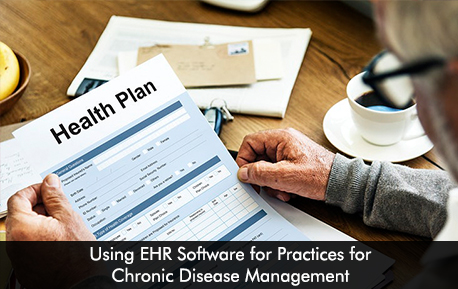The efficient use of the Electronic Medical Records (EMR) software system can help to enhance chronic disease management. By utilizing your EHR Software solution physicians can help see patients with long-term conditions and illnesses. Chronic illnesses are a big challenge for both healthcare providers and patients and according to the CDC, seven out of ten deaths each year amongst Americans is due to heart diseases and diabetes.
Chronic diseases need to be monitored closely and EMR software solution provides a great way for doctors to manage patients with chronic conditions over time. The improved care coordination between care providers and patients themselves even helps to take care of patients with multiple chronic diseases. The clinical decision support tools in the EMR software technology improves overall chronic disease management.
EHR software managing the health of patients with chronic conditions
Medication adherence
Medication compliance is vital to make sure that patients are safely monitored and don’t skip the dosages that are important to keep them away from fatal conditions that can trigger. The in-built robust tools in the EMR software system such as automatic reminders and texts for patients ensure that they take the exact dosage at the right time. The care process can be streamlined and the patient’s progress can be tracked effectively.
A bridge of communication
A good EMR software offers the patient portal functionality which offers seamless communication between physicians and patients. Patients having chronic conditions can benefit from real-time and HIPAA compliant messaging platform by staying connected with their doctor round the clock. Patients can quickly and easily ask questions related to medication dosage and other health-related concerns. Through the patient portal platform providers can rapidly answer patient queries even after clinic hours.
Telemedicine
Telemedicine EMR software solutions have made it easy for providers to diagnose and treat patients who live in the outskirts or are unable to visit the hospital facility due to health conditions, physical disability, and geographical barriers. Virtual sessions connect doctors and patients which helps in monitoring patient conditions promptly. Through telemedicine, physicians can guide their patients to improve self-care and manage their overall health.
Conclusion
Chronic disease management can be a problem for the US healthcare system. Through the help of digital tools, technology, and software systems hospital admission rates can be considerably reduced and adverse cases can be prevented. When Electronic Health Records software solutions are used effectively then they can be used to comprehensively manage the health of patients with chronic conditions. Precise and prompt care can be provided which is crucial for improved chronic disease management and preventive care.







